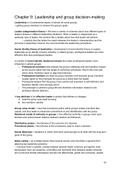Chapter 9: Leadership and group decision-making
Leadership is a fundamental aspect of almost all social groups.
= getting group members to achieve the group’s goals
Leader categorisation theory = We have a variety of schemas about how different types of
leaders behave in different leadership situations. When a leader is categorized as a
particular type of leader, the schema fills in details about how that leader will behave.
→ predicts that the better the match between the leader’s characteristics and the
perceiver’s leadership schema, the more favorable the leadership perceptions.
Social identity theory of leadership = development of social identity theory to explain
leadership as an identity process whereby, in salient groups, prototypical leaders are more
effective than less prototypical leaders.
A number of social identity related processes that make prototypical leaders more
influential in salient groups:
● Prototypical members best embody the group’s attributes and are therefore viewed
as the source rather than the target of conformity processes; they're the ones with
whom other members seem to align their behavior.
● Prototypical members are liked as group members and because group members
usually agree on the prototype the group as a whole likes the leader.
● Prototypical leaders find the group more central and important to self-definition and
therefore identity more strongly with it.
● The prototype is central to group life and therefore information related to the
prototype attracts attention.
A key attribute of an effective leader is activity that defines or changes:
1. what the group sees itself as being
2. the members’ identity
Group value model = view that procedural justice within groups makes members feel
valued, and thus leads to enhanced commitment to and identification with the group.
Relational model of authority in groups = how effective authority in groups rests upon
fairness-and justice-based relations between leaders and followers.
Distributive justice = the fairness of the outcome of a decision.
Procedural justice = the fairness of the procedures used to make a decision.
Social dilemmas = situations in which short-term personal gain is at odds with the long-term
good of the group.
Glass ceiling = an invisible barrier that prevents women and minorities in general from
attaining top leadership positions.
→ because there is greater overlap between general leader schemas and agentic male
stereotypes (men are assertive, controlling and dominant) than between leader schemas
and communal female stereotypes (woman are affectionate, gentle and nurturant), people
43





